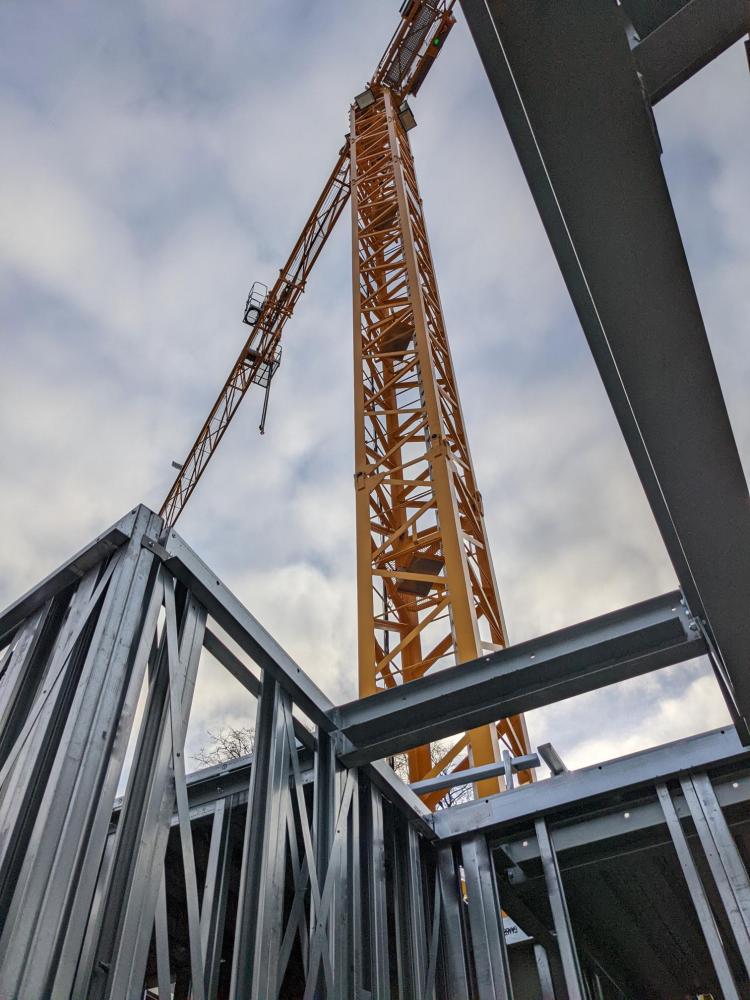
Light Steel Frame Wins at Abbey Wall A brand new six-storey apartment block at the Abbey Wall development in Merton, South West London has been constructed over a third faster than traditional concrete methods, while mitigating on-site safety risks, thanks to a pre-manufactured steel framed system from Intrastack.
Constructed in just 25 weeks by RJB Interiors (RJB) for main developer, Indigo Scott, the mixed-use residential scheme comprises 66 apartments and a commercial unit to the ground floor. Due to the six-storeys and composite concrete floor, a lighter, more versatile structure was required to support the construction. The developer opted for Intrastack's light gauge steel system. Not only was it able to provide the right strength and weight-bearing capacity, but it also enabled the team to speed up the construction programme to deliver a quicker return-on-investment.
A typical concrete frame project of this size would likely run to a 30-week programme to install the frame, followed by a further 10 weeks of exterior wall construction. In contrast, the Intrastack solution was installed fully in just 25 weeks. Critical to the project's success was the ability to manufacture the steel frame offsite, using a just-in-time approach to help improve build times and eliminate on-site fabrication. This process was carefully co-ordinated with planned delivery sequences to complement the build programme and ensure a seamless installation process.
Matthew Kirby, Commercial Director from RJB Interiors said: "We pride ourselves in delivering an efficient and cost-effective programme for our clients. The combination of the speed of construction on-site, alongside a high quality, durable end-product from Intrastack has enabled us to deliver an overall cost saving to our client. We spent approximately 15 weeks less on-site than would have been required with a concrete frame construction and this clearly translates into both labour and plant cost savings, estimated to be in the region of £60,000.
"Fabricating the panels offsite in a quality, process driven manufacturing environment has helped to reduce health and safety concerns. With no cutting or fabrication required on-site, we were able to reduce site preliminaries and plant costs, with rapid construction of the primary structure, allowing us to commence on-site activities much earlier than with traditional construction.
In particular, the offsite manufacturing techniques meant that waste was handled in a controlled environment, and we had confidence that any offcuts would be either reused or disposed of responsibly. This is a significant benefit on-site, and we estimate that waste was reduced by as much as 50%, plus the associated time of processing and managing waste disposals.
"Much of the build also took place during the winter months with exposure to the British weather. Concrete construction can be a lengthier process during the colder months, while we wait for the product to dry. The steel frame is less dependent on site and weather conditions during construction than traditional methods and has enabled a greater productivity rate on-site."
Intrastack has invested over a quarter of a million pounds on comprehensive system testing to ensure each suite of products meets all building performance requirements. By combining steel frame construction with a concrete floor, the buildings acoustic performance is enhanced, and the tested fire performance offers 120 minutes of protection.
Matthew Grant, Technical Product Manager from Intrastack added: "We offer a complete 'through the wall' offer, comprising the internal and external boards, composite concrete floors, and insulation. From the initial concept drawings, we have worked with RJB and Indigo Scott to construct a durable, high performance steel frame system that would meet their needs for speed of construction, improved on-site safety and a reduction in build costs."
Source: www.intrastack.co.uk
Read the full article, go to Offsite MagazineStay in touch: